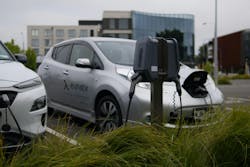Ambitious state EV adoption goals put pressure on multifamily owners to provide chargers
California’s recently announced ban on the sale of new gas-powered vehicles starting in 2035—and New York’s recent decision to follow suit—are putting pressure on multifamily property owners to install charging stations for tenants.
Owners have numerous business models and potential partners that offer multiple types of incentives, making the formation of a strategy a complex undertaking. They must consider the costs for chargers and the potential need to install additional electrical capacity costing up to six figures per apartment building.
One option is to outsource chargers to third-party vendors, but vendors may be cool to the idea because of the current lack of a critical mass of users. Even if this option is available to them, owners could still be on the hook for installing electric infrastructure to support charging stations.
Some programs have been created to address that need. Southern California Edison, for example, earmarked $436 million to install 35,000 charge ports. The program focused on disadvantaged communities with 30% of funds dedicated for multifamily homes.
While that program has proven to be popular, attracting twice as many applicants as it can serve, the utility expects to run out of these funds by the end of the year. It’s important that landlords find solutions to the charger challenge soon, with demand from renters predicted to grow significantly in coming years as declining sticker prices of some EV models make them more attractive to a wider swath of the population.
